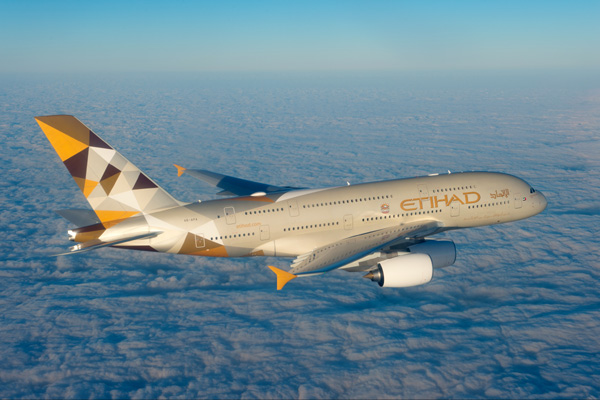
Etihad operates eco-flight to Brussels
ABU DHABI, January 13, 2020
Etihad Airways marked Abu Dhabi Sustainability Week 2020 by operating a special ‘eco-flight’ from Abu Dhabi to Brussels, featuring a range of initiatives designed to illustrate the airline’s broad commitment to sustainable practices in the air and on the ground.
Flight EY 57 departed at 2.20am on January 13 using a Boeing 787 Dreamliner aircraft, the newest and most efficient type in the Etihad fleet, which consumes at least 15 per cent less fuel than any aircraft type previously flown by the airline.
The aircraft will follow an optimised flight route facilitated by the European airspace navigation service provider Eurocontrol to reduce fuel consumption and carbon emissions.
A range of other initiatives will be undertaken before, during and after the flight to highlight incremental opportunities to reduce the airline’s impact on the environment.
Tony Douglas, Group chief executive officer, Etihad Aviation Group, said: “Sustainable practice is a critical and continuing challenge for the air transport industry, which is striving to reduce carbon emissions and waste, while meeting soaring demand for air travel. It is also a key priority for the Emirate of Abu Dhabi, in which Etihad is a critical driver of both social and economic development."
“This year’s national theme of the UAE is ‘2020: Towards the next 50’. Etihad is committed to working continuously with a range of partners as part of a broader national focus on environmental sustainability.”
At the core of its commitment to sustainable flying, Etihad Airways continues to invest in the latest generation, most fuel-efficient aircraft, increasing its fleet of Boeing 787 Dreamliners and preparing to induct three new types, the wide-bodied Airbus 350-1000 and Boeing 777-9, and the narrow-bodied Airbus A321neo.
Etihad Airways recently partnered with First Abu Dhabi Bank and Abu Dhabi Global Markets to become the first airline to secure commercial funding conditional upon compliance with the Sustainable Development Goals of the United Nations and is exploring options for similar funding of other initiatives.
The airline has announced the Etihad Greenliner Programme, through which its entire fleet of Boeing 787s will be used as flying testbeds for a range of sustainability initiatives by Etihad and its industry partners. The first such partner is Boeing, which will join Etihad in a comprehensive research programme, beginning next week with the delivery of a new ‘signature’ Boeing 787, specially-themed to highlight the sustainability partnership of the two companies.
Etihad is also a strong supporter of sustainable aviation fuels and continues to partner with providers including Abu Dhabi National Oil Company (ADNOC) and Tadweer (Abu Dhabi Waste Management Centre) on future fuel initiatives.
In addition to the optimised flight route, initiatives to support Brussels ‘Ecoflight’ also include:
• Minimal single-use plastics on board, including removal of plastic wrapping from blankets, headsets wrapped in paper (Economy) and velvet bags (Business), plastic-free amenity kits; lightweight metal cutlery (Sola Cutlery the Netherlands), meals served in aluminium dishes, water served in recyclable tetra-pack boxes, and hot beverage cups to be replaced with recyclable cups (Butterfly Cup);
• Innovative wheat-based plates (Biotrem) for on-demand meals in Business;
• Electric tractors to help ferry freight and luggage between the terminal and the aircraft in Abu Dhabi. The airline has just received the first 10 of 94 such vehicles, to be introduced during 2020;
• Expedited taxi time from the Abu Dhabi terminal to the runway, to minimise or eliminate holding time with engines running;
• En-route use of a range of fuel optimisation techniques, and;
• The use of ground power at both Abu Dhabi and Brussels airport terminals instead of the aircraft’s own fuel-powered auxiliary power unit.
Brussels Airport is ‘climate neutral’ in its own carbon emissions through extensive initiatives including the use of electric buses for passenger transport and compressed natural gas for its own service vehicles, and is exploring options including the use of electric vehicles for aircraft push-back and taxi-out.
Etihad is also implementing or considering sustainability initiatives including:
• Waterless cleaning of aircraft exteriors, improving presentation and removing grease and dirt to ‘smooth’ the fuselage and minimise aerodynamic ‘drag’;
• ‘Eco-wash’ cleaning of aircraft engines to help improve fuel efficiency and minimise emissions;
• Other on-board initiatives designed to reduce aircraft weight or optimise performance, resulting in lower fuel consumption and emissions, and;
• Reduction of single use plastics by 80 per cent by 2022. - TradeArabia News Service








